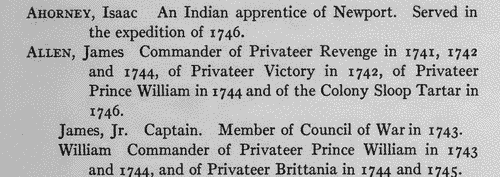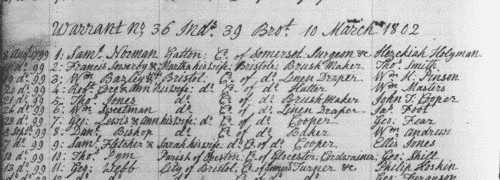Add this eBook to your basket to receive access to all 54 records. Our indexes include entries for the spelling spinney. In the period you have requested, we have the following 54 records (displaying 1 to 10): These sample scans are from the original record. You will get scans of the full pages or articles where the surname you searched for has been found. Your web browser may prevent the sample windows from opening; in this case please change your browser settings to allow pop-up windows from this site. Inhabitants of Salisbury
(1443-1704)
A collection of transcripts of churchwardens' accounts from the parishes of St Edmund and St Thomas in Sarum (Salisbury in Wiltshire) by Henry James Fowle Swayne, the Recorder of Wilton, was published by the Wilts Record Society in 1896. The greater part of these accounts relate to expenditure to workmen on the church fabric, and income for rent of pews and the tolling of bells and obsequies for parishioners. There are several sources covered: the churchwardens' accounts for St Edmund's for 1443 to 1461; for St Thomas's 1545 to 1690, and some notes from 1704; and accounts of the stewards of the Fraternity of Jesus Mass founded in St Edmund's. | Sample scan, click to enlarge

|  Masters of Apprentices registered at Dorchester in Dorset
(1741-1745) Masters of Apprentices registered at Dorchester in Dorset
(1741-1745)
Apprenticeship indentures and clerks' articles were subject to a 6d or 12d per pound stamp duty: the registers of the payments usually give the master's trade, address, and occupation, and the apprentice's father's name and address, as well as details of the date and length of the apprenticeship. There are central registers for collections of the stamp duty in London, as well as returns from collectors in the provinces. These collectors generally received duty just from their own county, but sometimes from further afield. (The sample entry shown on this scan is taken from a Norfolk return) | Sample scan, click to enlarge

| Rhode Island Soldiers and Sailors
(1740-1748)
On the outbreak of the War of the Austrian Succession against various European powers, there was a muster in Rhode Island for the defence of the colony, and privateers were manned to harry Spanish, and later French, shipping. Howard M Chapin compiled this comprehensive list of soldiers and sailors from the surviving records. | Sample scan, click to enlarge

|  Masters of Apprentices registered at Dorchester in Dorset
(1750-1754) Masters of Apprentices registered at Dorchester in Dorset
(1750-1754)
Apprenticeship indentures and clerks' articles were subject to a 6d or 12d per pound stamp duty: the registers of the payments usually give the master's trade, address, and occupation, and the apprentice's father's name and address, as well as details of the date and length of the apprenticeship. There are central registers for collections of the stamp duty in London, as well as returns from collectors in the provinces. These collectors generally received duty just from their own county, but sometimes from further afield. (The sample entry shown on this scan is taken from a Norfolk return) | Sample scan, click to enlarge

|  Masters of Apprentices
(1756) Masters of Apprentices
(1756)
Apprenticeship indentures and clerks' articles were subject to a 6d or 12d per pound stamp duty: the registers of the payments usually give the master's trade, address, and occupation, and the apprentice's name, as well as details of the date and length of the apprenticeship. 13 September to 31 December 1756. | Sample scan, click to enlarge

|  Apprentices registered in Dorset
(1758) Apprentices registered in Dorset
(1758)
Apprenticeship indentures and clerks' articles were subject to a 6d or 12d per pound stamp duty: the registers of the payments usually give the master's trade, address, and occupation, and the apprentice's name, as well as details of the date and length of the apprenticeship. There are central registers for collections of the stamp duty in London, as well as returns from collectors in the provinces. These collectors generally received duty just from their own county, but sometimes from further afield. The indentures themselves can date from a year or two earlier than this return. (The sample entry shown on this scan is taken from a Bristol return. Each entry has two scans, the other being the facing page with the details of the indenture, length of service, and payment of duty.) IR 1/53 | Sample scan, click to enlarge

|  Masters of Apprentices
(1773) Masters of Apprentices
(1773)
Apprenticeship indentures and clerks' articles were subject to a 6d or 12d per pound stamp duty (late payment of the 6d rate attracted double duty (D D) of 12d): the registers of the payments usually give the master's trade, address, and occupation, and the apprentice's name, as well as details of the date and length of the apprenticeship. 2 January to 2 November 1773 | Sample scan, click to enlarge

|  Masters of apprentices registered in Scotland
(1776) Masters of apprentices registered in Scotland
(1776)
Apprenticeship indentures and clerks' articles were subject to a 6d or 12d per pound stamp duty: the registers of the payments usually give the master's trade, address, and occupation, and the apprentice's name, as well as details of the date and length of the apprenticeship. There are central registers for collections of the stamp duty in London, as well as returns from collectors in the provinces. These collectors generally received duty just from their own county, but sometimes from further afield. The indentures themselves can date from a year or two earlier than this return. (The sample entry shown on this scan is taken from a Bristol return. Each entry has two scans, the other being the facing page with the details of the indenture, length of service, and payment of duty.) IR 1/59 | Sample scan, click to enlarge

| Inhabitants of Blandford Forum in Dorset
(1790-1797)
The provincial sections of the Universal British Directory include lists of gentry and traders from each town and the surrounding countryside, with names of local surgeons, lawyers, postmasters, carriers, &c. (the sample scan here is from the section for Bath). The directory started publication in 1791, but was not completed for some years, and the provincial lists, sent in by local agents, can date back as early as 1790 and as late as 1797.
| Sample scan, click to enlarge

|  Masters of apprentices registered in Dorset
(1803) Masters of apprentices registered in Dorset
(1803)
Apprenticeship indentures and clerks' articles were subject to a 6d or 12d per pound stamp duty: the registers of the payments usually give the master's trade, address, and occupation, and the apprentice's name, as well as details of the date and length of the apprenticeship. There are central registers for collections of the stamp duty in London, as well as returns from collectors in the provinces. These collectors generally received duty just from their own county, but sometimes from further afield. The indentures themselves can date from a year or two earlier than this return. (The sample entry shown on this scan is taken from a Bristol return. Each entry has two scans, the other being the facing page with the details of the indenture, length of service, and payment of duty.) IR 1/70 | Sample scan, click to enlarge

|
Research your ancestry, family history, genealogy and one-name study by direct access to original records and archives indexed by surname.
|












